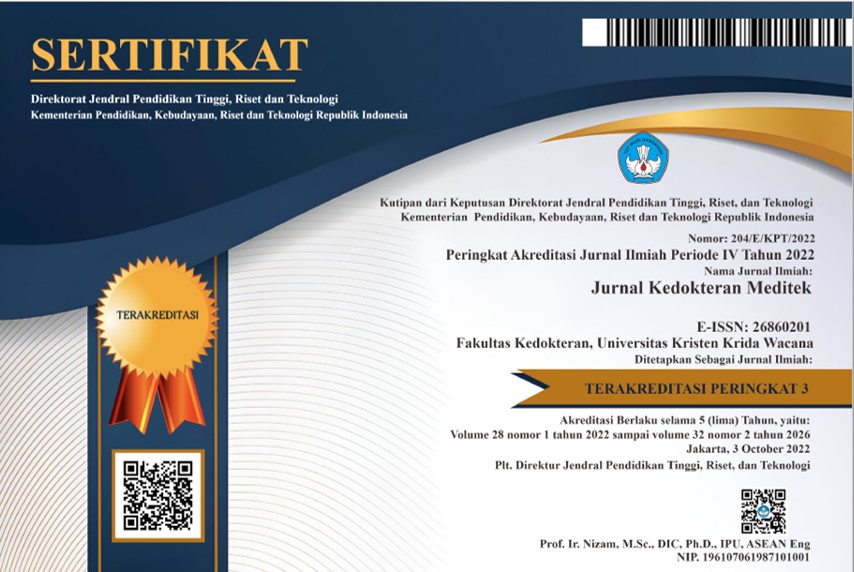Faktor-Faktor yang Berhubungan dengan Keberhasilan Terapi GERD
DOI:
https://doi.org/10.36452/jkdoktmeditek.v22i60.1447Abstract
Abstrak
Introduksi: Penyakit Refluks Gastro Esofagus (PRGE) atau yang lebih dikenal dengan nama Gastro Esophageal Reflux Disease (GERD), merupakan kondisi yang terjadi bila aliran balik isi lambung ke esofagus memberikan keluhan dan mengganggu kualitas hidup seseorang.
Tujuan: Penelitian ini bertujuan untuk menganalisis faktor-faktor yang berhubungan dengan keberhasilan terapi GERD, serta menguji keefektifan dalam mendiagnosis GERD dengan menggunakan kuesioner GERD Q.
Metode: Enam puluh subjek yang memiliki gejala heartburn dan atau regurgitasi didata selama periode Maret-Mei 2015, dengan menggunakan disain analitik kuantitatif observasional. Kuesioner GERD Q terdiri atas enam pertanyaan sederhana meliputi gejala refluks, dispepsia, dan konsumsi obat, skor ≥8 yang mendukung diagnosis GERD. Pasien GERD diterapi selama dua minggu dan diberikan obat sesuai dengan resep dokter dan kontrol kembali.
Hasil: Berdasarkan hasil univariat, didapatkan 56,7% (34 subjek) adalah perempuan, gejala klinis heartburn atau regurgitasi saja ditemukan 63.3% (38 subjek), usia < 40 sebanyak 55% (33 subjek), nilai IMT ≥25 ditemukan 66.7% (40 subjek), pemberian terapi PPI dan prokinetik ditemukan 50% (30 subjek), gaya hidup sehat sebanyak 81.7% (49 subjek), dan GERD Q post-test yang membaik sebanyak 66.7% (40 orang). Pada hasil bivariat didapatkan hubungan yang bermakna antara
keberhasilan terapi dengan usia (p 0.028 ,OR 3.667), jenis kelamin (p 0.002; OR 7.667), gejala klinis (p 0.037; OR 3.222), IMT (p 0.033; OR 4.188), dan terapi (p 0.001; OR 7.429).
Kesimpulan: Pasien GERD di RSUD Koja yang berusia ≥ 40 tahun, laki-laki, nilai IMT ≥ 25 kg/m2, dan memiliki gejala heartburn atau regurgitasi saja, setelah diterapi dengan PPI dan prokinetik memiliki keberhasilan terapi yang lebih baik. Tetapi keberhasilan terapi GERD tidak dipengaruhi gaya hidup.
Kata kunci: GERD Q, heartburn, regurgitasi, terapi
Abstract
Introductions: Gastro Esophageal Reflux Disease (PRGE) or better known as Gastro Esophageal Reflux Disease (GERD) is a condition that occurs when the backflow of gastric contents into the esophagus giving complaints and interfere with quality of life.
Objective: This study aimed to analyze the factors associated with the therapeutic efficacy on GERD as well as to test the effectiveness of using questionnaire that are to diagnose, GERD Q.
Methods: Sixty subjects with symptoms of heartburn and regurgitation recorded during the period from March until May 2015 using a quantitative analytical observational design. Q GERD questionnaire consist of six simple questions include symptoms of reflux, dyspepsia and drug consumption, the score ≥8 that support the diagnosis of GERD. GERD patients treated for 2 weeks and was given medication as prescribed and control back.
Results: Based on univariate results, 56.7% (34 subjects) were women, the clinical symptoms of heartburn or regurgitation alone found in 63.3% (38 subjects), age <40 were 55% (33 subjects), the value of BMI ≥25 was found 66.7% (40 subjects), PPI and prokinetic therapy found 50% (30 subjects), a healthy lifestyle as much as 81.7% (49 subjects) and GERD Q post-test were improved as much as 66.7% (40 people). In the bivariate results of a significant association between the therapeutic efficacy with age (p 0.028, OR 3667), gender (p 0.002; OR 7,667), clinical symptoms (p 0.037; OR 3.222), BMI (p 0.033; OR 4188), and therapy (p 0.001; OR 7429).
Conclusion: Patients GERD in Koja Hospital ≥ 40 years old, male, BMI values ≥ 25 kg / m2, and have symptoms of heartburn or regurgitation alone, after therapy with PPI and prokinetic have a better therapeutic success. But the success of GERD therapy is not influenced by lifestyle.
Keywords: Q GERD, heartburn, regurgitation, therapy

















